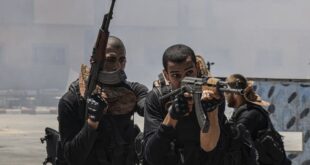 TWO FIGHTERS OF Al Aqsa Martyrs’ Brigades were killed Wednesday in an Israeli air strike along the Gaza Strip border with Israel, Palestinian security sources and witnesses said.
TWO FIGHTERS OF Al Aqsa Martyrs’ Brigades were killed Wednesday in an Israeli air strike along the Gaza Strip border with Israel, Palestinian security sources and witnesses said.
They said an Israeli aircraft fired a missile at a group of Palestinians near the Kissufim crossing between the central Gaza Strip and Israel.
Witnesses reported that two Kalashnikov assault rifles were found next to the bodies.
Al Aqsa Martyrs’ Brigades, an armed offshoot of moderate Palestinian Authority President Mahmoud Abbas’ mainstream Fateh faction, later identified the two gunmen as Ibrahim Mohammad Messaud, 20, and Mohammen Adnan Amudi, 22.
The two were on their way to carry out an attack in revenge for repeated Israeli shelling of the Gaza Strip and the “assassination” of Palestinian fighters, the group said.
An Israeli army spokeswoman had earlier said that troops had opened fire and wounded two Palestinian gunmen in Gaza.
“Two armed Palestinians were identified trying to cross the fence into Israel, south of the Kissufim crossing,” she told AFP.
The men were wounded after a tank opened fire and an Israeli aircraft fired at them, she said, adding that the two were also carrying explosive devices.
The latest deaths bring to 5,019 the overall toll since the September 2000 start of the Palestinian uprising, according to an AFP count. The vast majority of the dead are Palestinian.
Meanwhile, the UN agency for Palestinian refugees said Wednesday that its work would continue unchanged, seeking to minimise the effect of a new UN policy to restrict contact with the Hamas-led government.
“I think that the message that was given out was a little harsher than it was intended,” Karen Abu Zayd, the head of UNRWA, told a news conference in Gaza City, one day after the United Nations announced a new restrictive policy.
She said that UNRWA had received no instruction from UN headquarters in New York on not meeting Hamas ministers.
“It doesn’t make sense to reduce contacts when you’ve been asked to increase your activities,” Abu Zayd said, stressing that UNRWA had “no intention of changing our operations.”
“We are encouraged to do more and to have as much contact as necessary to carry out additional operations and certainly to maintain what we are doing now… For us there is no change in the humanitarian side,” she said.
She said her interlocutor on the Palestinian side was the department of refugee affairs with which her organisation met last week and intended to meet on Thursday.
A UN spokesman in New York said on Tuesday that political contacts with the Hamas-led Palestinian government would now be decided on a case-by-case basis.
“Working contacts with the new Palestinian government will continue,” Stephane Dujarric told reporters. “But political contacts will be dealt with as they arise on a case-by-case basis.”
Since 1950, UNRWA has provided a large part of fundamental services such as education, health, social services and food aid in Palestinian refugee camps in the Gaza Strip, West Bank, Jordan, Lebanon and Syria.
In another development, a delegation of EU deputies met Palestinian MPs from Hamas on Wednesday and urged the European Union to reconsider its decision to freeze badly needed aid to the Hamas-led government.
Ten EU lawmakers met Palestinian Parliament Speaker Aziz Duweik in the West Bank city of Ramallah and other Hamas deputies in the Gaza Strip, Louisa Morgantini, a member of the Italian Communist Party, told a press conference in Gaza City.
“We came here to meet all the members of the Palestinian Legislative Council without discrimination at all because it represents the democratic will of the people,” she said.
“We are committed to push the EU not to let down the Palestinian people and not to let them die of hunger.”
The European Union last week decided to freeze millions of euros in direct financial aid to the cash-strapped Palestinian Authority over the failure of Hamas to renounce violence, recognise Israel and recognise past agreements with the Jewish state.
“We call upon the EU to reconsider this decision and resume the dialogue,” British Liberal-Democrat MP Chris Davies said. “It’s also important that the new government spells out its position [regarding Israel].”
The European MPs said they wanted to meet Israeli MPs but that the Israeli government did not allow them.
Israel has instituted a boycott of foreign diplomats who meet any members of the new Hamas-led government, although officials who meet with the moderate Abbas will not be shunned.
 Eurasia Press & News
Eurasia Press & News
